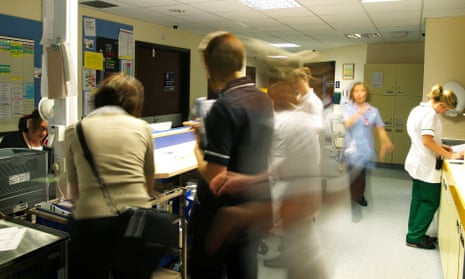Your editorial (22 September) and Rachel Clarke’s excoriating opinion piece (Instead of helping desperate NHS doctors like me, Thérèse Coffey is sticking in the boot, 22 September) demonstrate how the Tories continue to mismanage and impoverish state health and social care. George Osborne’s failed austerity economics, with a massively underfunded workforce and training provision, have led to a toxic escalation of costly – to the taxpayer – reorganisation/marketisation/outsourcing/privatisation. This is not going to be reversed by Thérèse Coffey’s risible “ABCD” agenda, which is based on no new investment.
I was on an 18-month waiting list for laser surgery on my prostate. Informed of little hope of medium-term surgery, I opted for private treatment, saw a urologist within a fortnight and was operated on shortly after. Astonishingly, I was contacted a week later by my local hospital offering the surgery using the same surgeon and private hospital in an attempt to shift the backlog. This urologist has a dual NHS and private consultancy – expensively trained by the state, but now enabling the private sector to offer desperate pensioners like myself a very expensive alternative. I would suggest that all NHS-trained doctors, nurses and consultants be salaried state employees and not allowed to moonlight. Then we may return to the original Bevan vision of free and first-class health provision regardless of status and income.
Philip Wood
Kidlington, Oxfordshire
Before rashly promising to free up GP appointments in England by using pharmacists and physiotherapists in practices (No one should wait more than two weeks to see GP, Coffey to say, 21 September), Thérèse Coffey would do well to ask her Scottish government counterpart why the Primary Care Improvement Fund (which is allocated for such work) is seriously underspent in almost all health board areas in Scotland.
There are not enough of these health professionals to take up such posts, and any who do are leaving an unfilled post in their wake elsewhere. It really is a simple maths problem. The plan is impossible to implement without a significant expansion in numbers of all health professionals.
Dr Pilar Murphy (GP)
Ellon, Aberdeenshire
The King’s Fund survey findings were sadly unsurprising (Two-thirds of trainee GPs in England plan to work part-time, study finds, 18 September). Those of the British Medical Association’s survey of about 650 GP trainees across the UK last year were just as stark, with only 16% saying they would work seven or more four-hour sessions a week after qualifying, and just 6% saying they intended to work full-time for their entire career.
The desire to work flexibly is multifaceted, and doctors choosing this route – including those with caring commitments – should be supported. However, the stress of working late, working through lunch, even taking work home, is the reality that GP trainees are seeing. A six-session week is in reality now full time, with sessions growing longer as pressures on general practice mount. Many will feel that the only way of managing their workload and protecting their wellbeing is to limit their hours.
Unless there are improvements to training, recruitment, retention and support for GPs throughout their careers, there will be one big loser: patients, who are already struggling to get the care they need.
Dr Euan Strachan-Orr
Chair, BMA GP trainees committee
